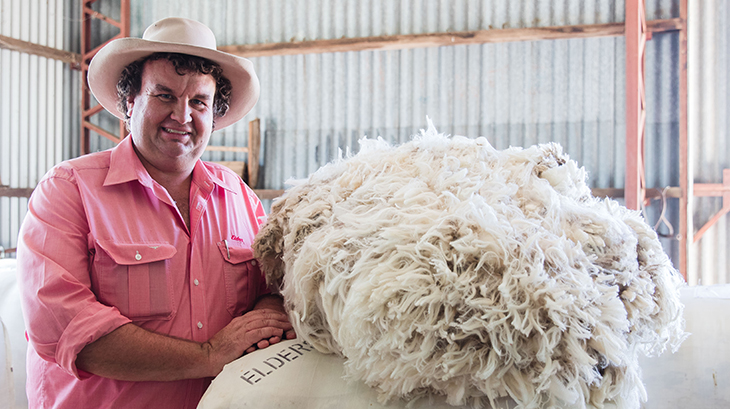Brett Smith joins SSF Board

New SSF board member Brett Smith.
Brett Smith brings a unique perspective to the Sheep Sustainability Framework Board through his dual role as District Wool Manager for Elders Rural Services and as a partner in his family’s wool growing operation at ‘Tralee’, near St George in southwest Queensland. He’s spent his life working around sheep and wool and was motivated to get involved in policy making through AgForce when wild dogs were decimating flocks across Queensland.
Brett Smith has seen plenty of change in the wool industry since he first studied wool classing at boarding school followed by a degree in Agricultural Economics at the University of New England in Armidale, NSW.
“We’ve seen a lot of commodities come and go but Merino wool has been around for a long time,” Mr Smith said.
“It’s a resilient industry and a good fit for the environment, and people are sticking with it because they want to be part of something sustainable.”
“I’m dealing with a lot of people from my generation who are coming back into the industry. There are more sheep than when I started but fewer growers, and the ones with Merinos are generally getting bigger, so there’s plenty of longevity in the industry.”
Brett is based in Tamworth as Elders Rural Services’ District Wool Manager for northwest NSW and southern Queensland. He’s also very involved in the family farm, in partnership with his parents Adrian and Ellen, and brother Mitch.
At ‘Tralee’, the Smiths maintain the traditional flock husbandry practices that Brett’s grandfather instigated but have also been open to adopting new technology such as AWEX’s (Australian Wool Exchange) WoolClip, that adds value to their business.
“We’re probably quite unique in that we’ve run a long-term, non-mulesed flock but Dad is an avid wool man and is always open to new ideas. For example, for WoolClip he uses an iPhone to scan QR codes on wool bales after pressing, and the classers’ specifications are uploaded to AWEX over the phone,” Mr Smith said.
“The advent of digital ag-tech and data collection leads to better business decisions but also makes demonstrating our sustainability credentials much easier, and there’s a lot of stuff in the pipeline that technology will make much easier to adopt.
“Dad sees it as being recognised for what we’ve always been doing.”
It’s important that the wool industry gets the messaging right about being a quintessentially renewable, clean and green fibre, he said, and make sure that regulation and other influences don’t dictate the industry’s direction.
“For commodities, you need qualitative stories along a quantitative chain, and I think using the technology and collecting the data will help the industry to prove it has great credentials on the ground.
“For example, the Responsible Wool Standard (RWS) which provides accreditation for non-mulesed wool was written in Europe and then applied here. But we have unique challenges with issues like predator control and the landscapes that we deal with, so Australia could potentially modify integrity schemes like the RWS to suit our conditions,” he said.
“With regard to the National Wool Declaration, there’s been a highly voluntary uptake of around 80% of growers who’ve either stopped mulesing or are using pain relief, so it’s a case of getting the metrics around what we’re doing already.”
Brett sees stock and station agents and wool brokers as playing a key role in ensuring growers are informed and documentation is done properly.
“It’s always been the broker’s role, passing on information in the best interests of our clients. Elders has just opened a world-first automated wool handling centre in Melbourne and our customers are always looking for grower stories.
“Companies based in Europe are looking for good direction on sustainability and the metrics to match. The exporters have sustainability and accreditation programs themselves so we’re trying to link it all up and make sure we have the right stories to take to people when they do come asking.”
Mr Smith has enjoyed being involved with policy making, initially through AgForce as Director on the Sheep and Wool Board and then on the board of WoolProducers Australia, before joining the SSF.
“You can be quite united on wool policy on a local front but when you get to the national level you find a lot of differing opinions, and it’s just a case of getting the policy settings right to benefit all producers.”
On the farm, he says the biggest challenge is finding the right workforce with skills in stock handling, as well as weather and prices.
“In the last 12 years we’ve experienced some of the driest seasons on record but made some of the best wool prices my generation has ever seen,” he said.
“The season in 2018–19 was the worst in 100 years but was offset by a combination of strong wool and sheepmeat prices.
“We also have to keep ahead of the ongoing regulations and traceability requirements. You just have to keep refreshing a lot of those issues and work out where your time and effort is most valuable”.
More information
Contact:
Resources: